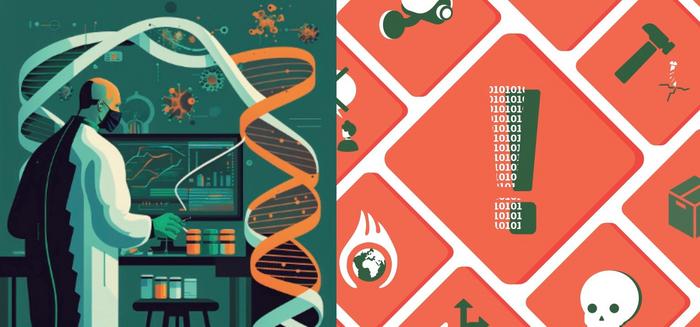Hazards posed by using data-centric methods to engineer biology, have been identified by experts at the University of Bristol with the aim of making future research safer.

Credit: Thomas Gorochowski
Hazards posed by using data-centric methods to engineer biology, have been identified by experts at the University of Bristol with the aim of making future research safer.
The potential misuse of data-centric approaches in synthetic biology poses significant risk. The ease of access to data science tools may enable nefarious actors to develop harmful biological agents for purposes such as bioterrorism or to disrupt ecological systems intentionally.
The findings, published today in Synthetic Biology, suggest additional Data Hazard labels that describe data related risks in area of synthetic biology.
- Uncertain accuracy of source data – The accuracy of the underlying data is not known and so its use may lead to erroneous results or introduce bias.
- Uncertain completeness of source data – Underlying data are of an uncertain completeness and have missing values that causes biased results.
- Integration of incompatible data – Data of different types and/or sources are being used together that may not be compatible with each other.
- Capable of ecological harm – This technology has the potential to cause broad ecological harm, even if used correctly.
- Potential experimental hazard – Translating technology into experimental practice can require safety precautions.
The work is the result of a collaboration between researchers from across the Bristol Centre for Engineering Biology (BrisEngBio) and the Jean Golding Institute for Data Intensive Research.
Kieren Sharma, co-author and PhD student working in AI for cellular modelling in the School of Engineering Mathematics and Technology said: “We’re entering a transformative era where artificial intelligence and synthetic biology converge to revolutionize biological engineering, accelerating the discovery of novel compounds, from life-saving pharmaceuticals to sustainable biofuels.
“Our study has uncovered potential risks associated with the specific types of data being used to train the latest systems biology models. For instance, inconsistencies in measurements from complex and dynamic living organisms and privacy concerns that could compromise the safety of next-generation models trained on human genome data.”
The project extends the work of the Data Hazards project (datahazards.com), which aims to create a clear vocabulary of the potential hazards of data science research.
Co-author and co-lead of the Data Hazards project, Dr Nina Di Cara from the School of Psychological Science, explained: “Having a clear vocabulary of hazards makes it easier for researchers to think proactively about what the risks of their work are and to help put mitigating actions in place. It also makes communication easier for people working across fields who sometimes use different language to talk about the same issues.”
To achieve these clear vocabularies, interdisciplinary collaboration is essential.
Dr Daniel Lawson, Director of the Jean Golding Institute and Associate Professor in Data Science in the School of Mathematics noted that: “As datasets grow in magnitude and ambition, increasingly sophisticated algorithms are developed to gain new insights. This complexity makes an un-siloed collaborative approach to identifying and preventing downstream harms essential.”
Dr Thomas Gorochowski, senior author and Associate Professor of Biological Engineering in the School of Biological Sciences, added: “Data science is set to revolutionize how we engineer biology to harness its unique capabilities to tackle global challenges covering the sustainable production of materials and fuels to the development of innovate therapeutics. The extensions developed by our team will help bioengineers consider and discuss risks around data-centric approaches to their research and help ensure the huge benefits of bio-based solutions are realized in a safe way.”
The study was funded by the Royal Society, BBSRC and EPSRC, and supported by the Bristol BioDesign Institute.
Paper:
‘Data hazards in synthetic biology’ by Natalie R Zelenka, Nina Di Cara, Kieren Sharma, Thomas E Gorochowski et al in Synthetic Biology.
Journal
Synthetic Biology
Method of Research
Data/statistical analysis
Article Title
Data hazards in synthetic biology
Article Publication Date
8-Jul-2024




